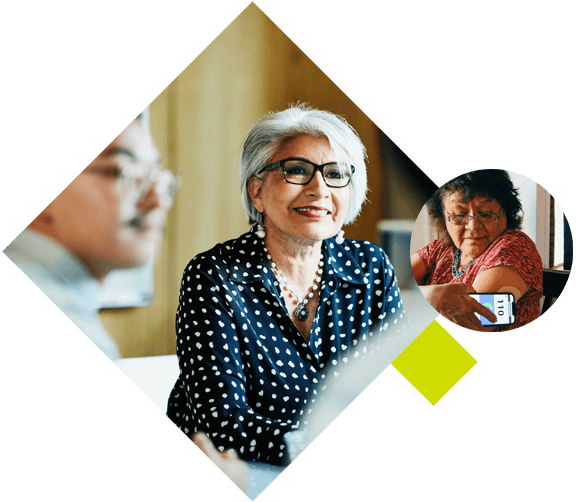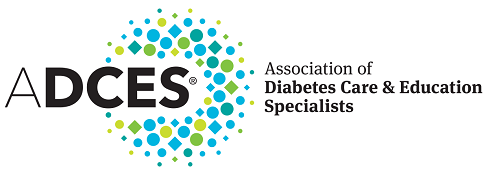
DSMES Reimbursement, Patient Access & Affordability
Increase DSMES program reach and impact by maximizing insurance reimbursement and helping people with diabetes find affordable care.
DSMES Reimbursement

Insurance Reimbursement Requires a Referral
Studies show DSMES reduces diabetes-related complications and encourages better management of the disease, but it doesn’t happen without a DSMES referral from a doctor, nurse practitioner or physician assistant. And insurance reimbursement by Medicare or commercial insurers doesn’t happen if the DSMES program isn’t accredited.
Learn how to become an ADCES®-accredited DSMES program.
How to Refer
We’ve created a sample referral order form that can be downloaded and adapted for your use. Included on this form is also an order for Medical Nutrition Therapy (MNT), which is often used in conjunction with DSMES, referred to as DSMT when billing. If using an electronic medical record (EMR), it's particularly helpful to have the referral order built in and easily accessible.
Reimbursement FAQs
Diabetes Reimbursement Frequently Asked Questions
We've helped thousands of healthcare professionals who provide DSMES navigate their diabetes reimbursement challenges, allowing them to be successful and continue to serve people with diabetes in their communities. Here are answers to the most frequently asked insurance reimbursement and billing questions.
To bill Medicare, the provider must have a DSMES program accredited by ADCES or recognized by ADA and must also be a Medicare provider billing Medicare for another reimbursable service before they can bill for DSMT. DSMES programs will have a sponsor that is recognized as a billing provider. (Sponsors can be individuals or entities.) Sponsors do not have to be a member of the DSMES team but will be part of the organization where DSMES is delivered.
RNs and CDCESs are not recognized as Medicare providers, so they're unable to bill under their own provider numbers. To bill Medicare for DSMT, you must have an accredited program through either ADCES or ADA. Billing for DSMT would then be done under the provider number that is the sponsor of the accredited program (i.e., RD, physician, advanced practitioner or hospital).
RNs and other team members are not recognized as Medicare providers, so they cannot bill for services under their own provider numbers. To bill Medicare for DSMT, you must have an accredited program through either ADCES or ADA. Billing for DSMT would then be done under the provider number that is the sponsor of the accredited program (i.e., RD, physician, advanced practitioner, or hospital).
A pharmacist is one of several key team members in an ADCES-accredited or ADA-recognized DSMT program, but since they're not recognized as individual DSMT billing providers, they cannot bill under their own NPI. The billing for DSMT would need to be done under the pharmacy’s NPI number assigned to the DSMES program (on the accreditation certificate). Many pharmacies already bill services to Medicare either as a DME supplier or Part D provider, but the pharmacy must submit the Form CMS-855B application to become a Part B provider.
They must enroll as a Medicare Part B provider even if they already completed Form CMS-855S. For more information, visit the CMS Medicare Provider Enrollment page.
DSMT Billing
Billing Codes for DSMT and MNT: Understanding What's Covered
Healthcare systems, clinics and primary care offices can maximize their DSMT billing potential by better understanding the DSMES reimbursement process, using the appropriate billing codes and submitting them correctly.
We’ve partnered with the Academy of Nutrition and Dietetics and the American Diabetes Association to help you understand which DSMES and MNT services are covered, the way they’re covered, and some of the more commonly used billing codes for DSMT.
But what about the other codes? There are many more you can likely use when providing diabetes-related services, so we’ve created a chart of all relevant billing codes, allowing you to maximize your billing potential. It covers the code and who can bill as well as increments, frequency and limits.
Additional Resources


CGM Insurance Lookup Tool
Will insurance cover a continuous glucose monitor or CGM? There’s an easy way to find out.
Check out our handy lookup tool to help you determine CGM coverage by payer, plan information (Medicare, Medicaid, commercial or others) and the state. If a policy is published, coverage information will appear.
Ask the Reimbursement Expert
Don't see your questions answered above?
If you're an ADCES member, we invite you to log in and ask our reimbursement expert. She's available to address a wide variety of questions on DSMES/DSMT billing and insurance coverage for our members.
Ask the Reimbursement ExpertDSMES Reimbursement Help
Not a member yet?
You too can benefit from our free Ask the Reimbursement Expert service by becoming an ADCES member.

Affordable Care
Working With People Who Are Underinsured
We’ve pulled together resources to help you address issues related to the cost of care. Our conversation guide will help you find out if cost is a barrier to your patients and how to address it. We’ve also compiled patient assistance and insulin assistance program resources on insulin, CGMs and insulin pumps, and non-insulin medications for you to share.
Starting Conversations About Cost
As a healthcare professional, you may not always be familiar with cost-of-care limitations that present significant barriers to your patients. By initiating conversations about out-of-pocket healthcare costs, you can take a vital step toward providing equitable and actionable care that meets the individual’s needs. We partnered with Beyond Type 1 to create guidance to help you navigate this discussion.
A Practical Guide to Having Healthcare Cost Conversations - English
Una guía práctica para tener conversaciones sobre los costos de atención médica - Spanish
Patient Assistance & Insulin Assistance Programs
There are a number of reasons why people with diabetes can't get the devices they need. One of the most common is cost. If you have a client or patient struggling to pay for supplies because they have no insurance or inadequate insurance, consider our guides that include patient assistance and insulin assistance programs by medication/device, discount card programs, organizational resources, and consideration depending on whether the patient is on Medicare, Medicaid, private insurance or is uninsured.
Insulin Cost Savings Resource Guide
Non-insulin Diabetes Medications Cost Savings Resource
CGM and Insulin Pump Cost Savings Resource
Insulin Affordability Resource
Lilly Helpline for People Seeking Solutions to Insulin Affordability

Become a DSMES Reimbursement Expert With Continuing Education
From an annual reimbursement update webinar to a program and business management certificate and many courses in between, we have the continuing education (CE) you need to understand Medicare changes, coding and coverage, and successful program management.


